In emerging markets, investors and stakeholders must understand the factors influencing property value.
Real estate in these regions is unique, with economic, environmental, and cultural elements driving its challenges and opportunities.
Analyzing these factors helps in crafting informed strategies for maximizing investment returns.
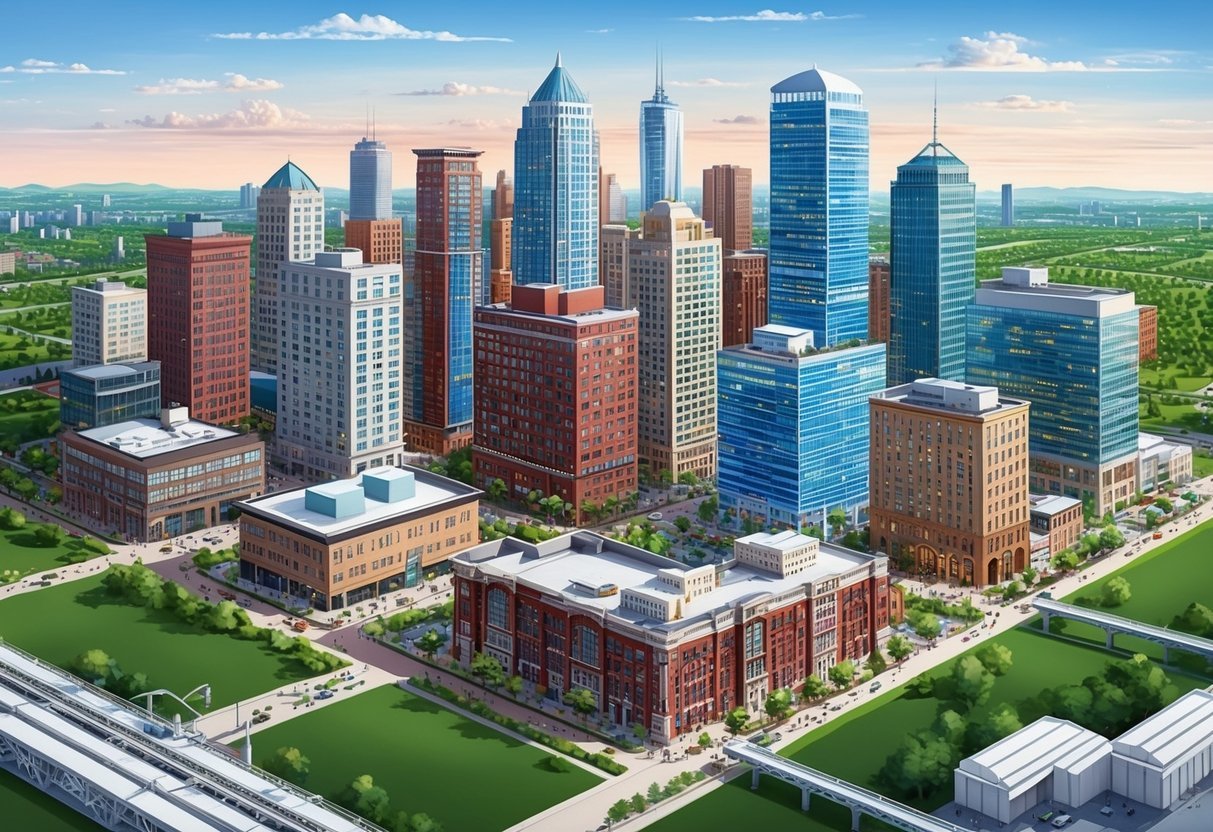
Our exploration into the factors affecting property value offers key insights into navigating the complexities of these markets. As we uncover the driving forces behind property valuation, this knowledge empowers us to better anticipate market shifts and capitalize on potential growth.
1) Infrastructure Development
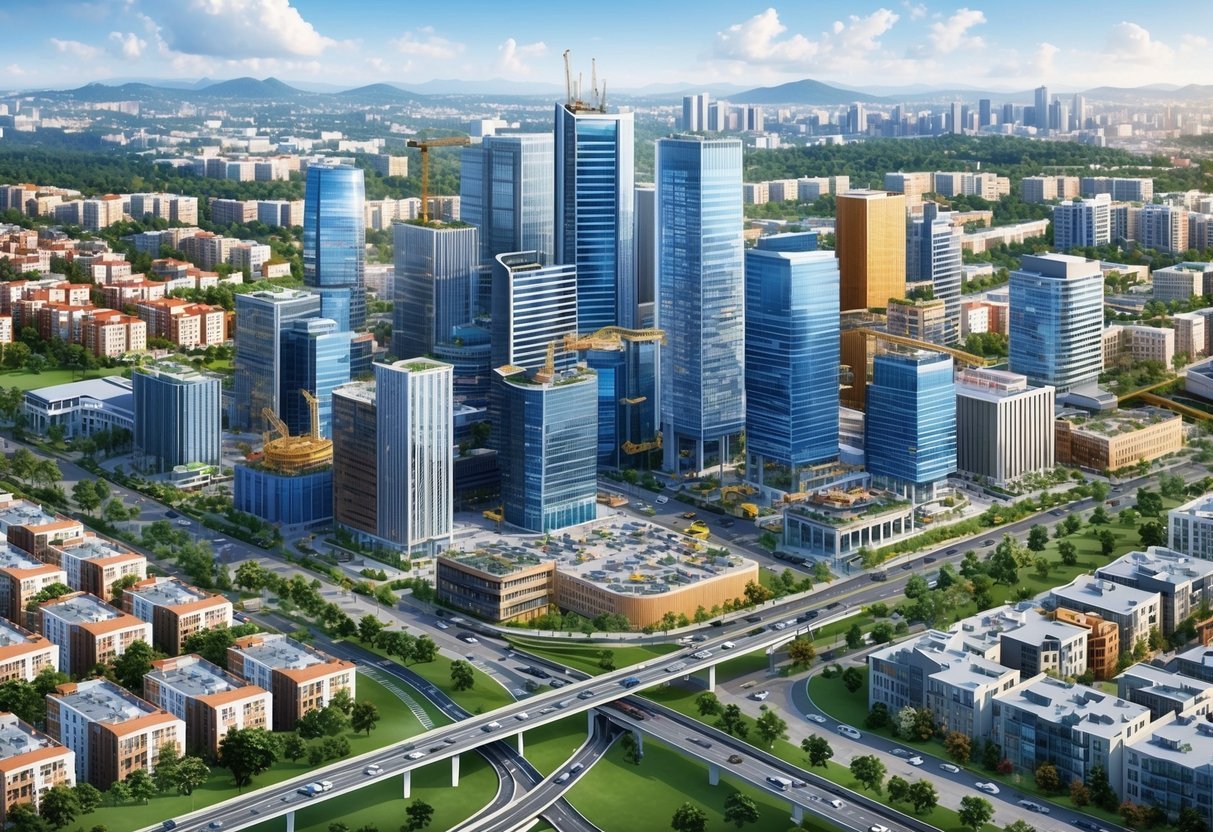
Infrastructure development plays a crucial role in shaping property values in emerging markets.
As cities expand, the availability of essential services like roads, public transport, water, and electricity becomes a significant factor in determining real estate attractiveness.
Increased connectivity through improved transportation networks can make previously undervalued areas more accessible, driving demand for residential and commercial properties.
When an area is better connected, its appeal to potential buyers and investors often increases, leading to higher property values.
Improved infrastructure also benefits accessibility to amenities, making a location more desirable.
Access to utilities and essential services, such as reliable electricity and water supply, is another critical aspect.
In emerging markets, the implementation and funding of infrastructure projects can be uncertain.
This uncertainty can create risks that may temper the positive impacts on property values.
We must consider these factors when evaluating real estate opportunities in these regions.
Sustainable infrastructure initiatives can enhance property appeal by promoting eco-friendly living.
As sustainability becomes a priority, properties in areas with green infrastructure might see growing demand, translating into increased value.
Infrastructure development is a pivotal factor influencing property values.
Understanding the potential benefits and risks associated with these projects is crucial for making informed decisions.
2) Political Stability
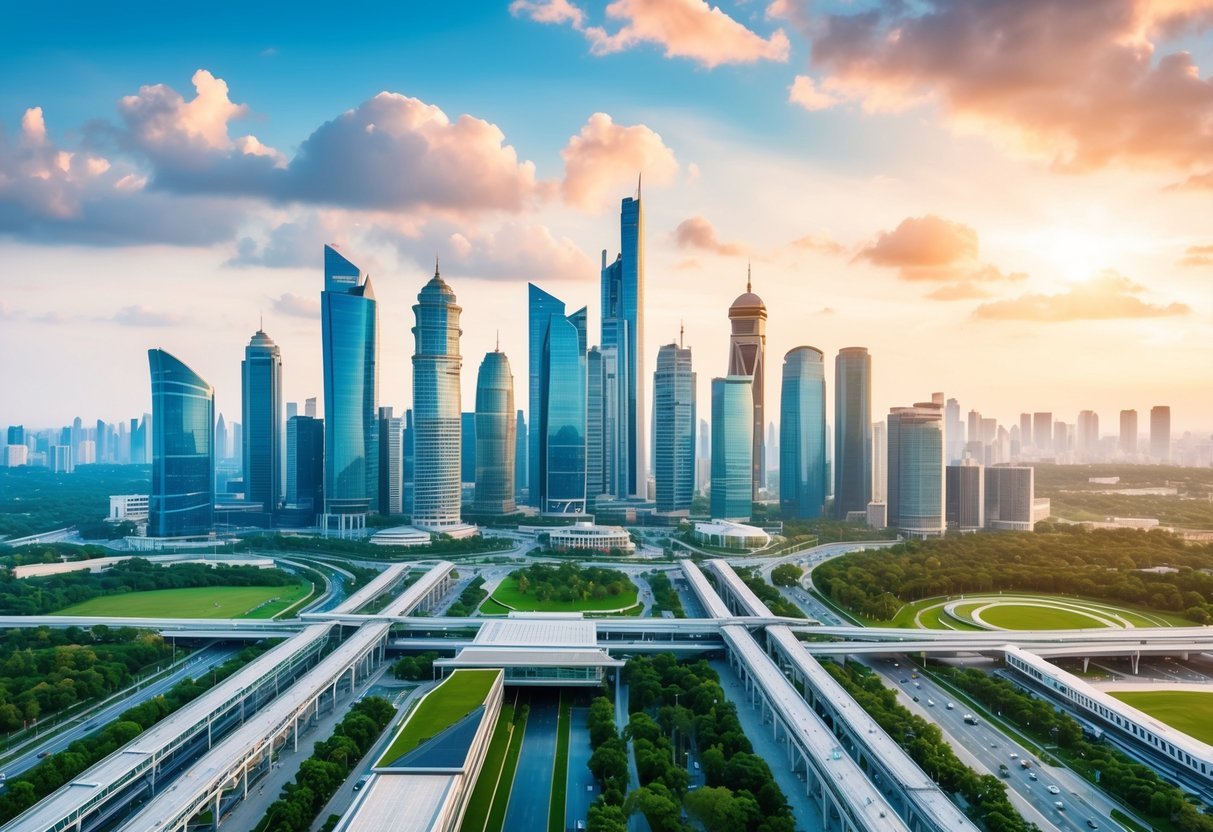
Political stability plays a crucial role in shaping the property values in emerging markets.
When a government maintains its stability, it fosters investor confidence, making these markets more attractive for real estate investments.
Stable political environments often come with consistent policies, which allow for predictable growth and development in property markets.
Unstable political conditions can create uncertainty and risk, deterring both domestic and international investors.
This uncertainty can lead to fluctuations in property values and hinder long-term investment strategies.
When political turmoil arises, investors may hesitate to commit resources, impacting the overall growth of the real estate sector.
Countries experiencing political upheaval may also face challenges with property rights and enforcement mechanisms.
This can further deter investment, as investors seek regions where their assets and interests are protected.
In contrast, stable governments are more likely to uphold property rights, encouraging investment and growth.
Emerging markets with stable political climates often see an influx of foreign capital.
This injection of funds can contribute to the development and improvement of infrastructure, enhancing property values.
Such investments not only support current real estate prices but also promote future market expansion.
3) Foreign Investment
Foreign investment is a critical variable in the valuation of properties in emerging markets.
As global investors seek new opportunities, they bring significant capital inflows that can drive demand for real estate.
This increased demand often results in property value appreciation.
When international investors target emerging markets, it is typically due to potential high returns.
The influx of foreign capital can lead to infrastructural development, transforming regions into desirable investment hubs.
Consequently, these areas may experience rapid property price escalation.
We must also consider policy shifts by governments aiming to attract foreign capital.
Many emerging countries have relaxed restrictions on inward investments, making it easier for international buyers to enter the market.
These policy changes can further stimulate property demand and value growth.
Currency exchange fluctuations play a role, too.
Investors may face currency risks, which can affect the real value of their investments.
This factor becomes crucial when evaluating the overall impact of foreign capital in emerging markets.
Finally, geopolitical stability and economic health in these regions can significantly influence foreign investment patterns.
Countries with robust economic forecasts and stable political climates usually attract more substantial foreign interest, benefiting local real estate markets.
As such, identifying these stable conditions is beneficial when predicting property value trends linked to foreign investment.
4) Regulatory Environment
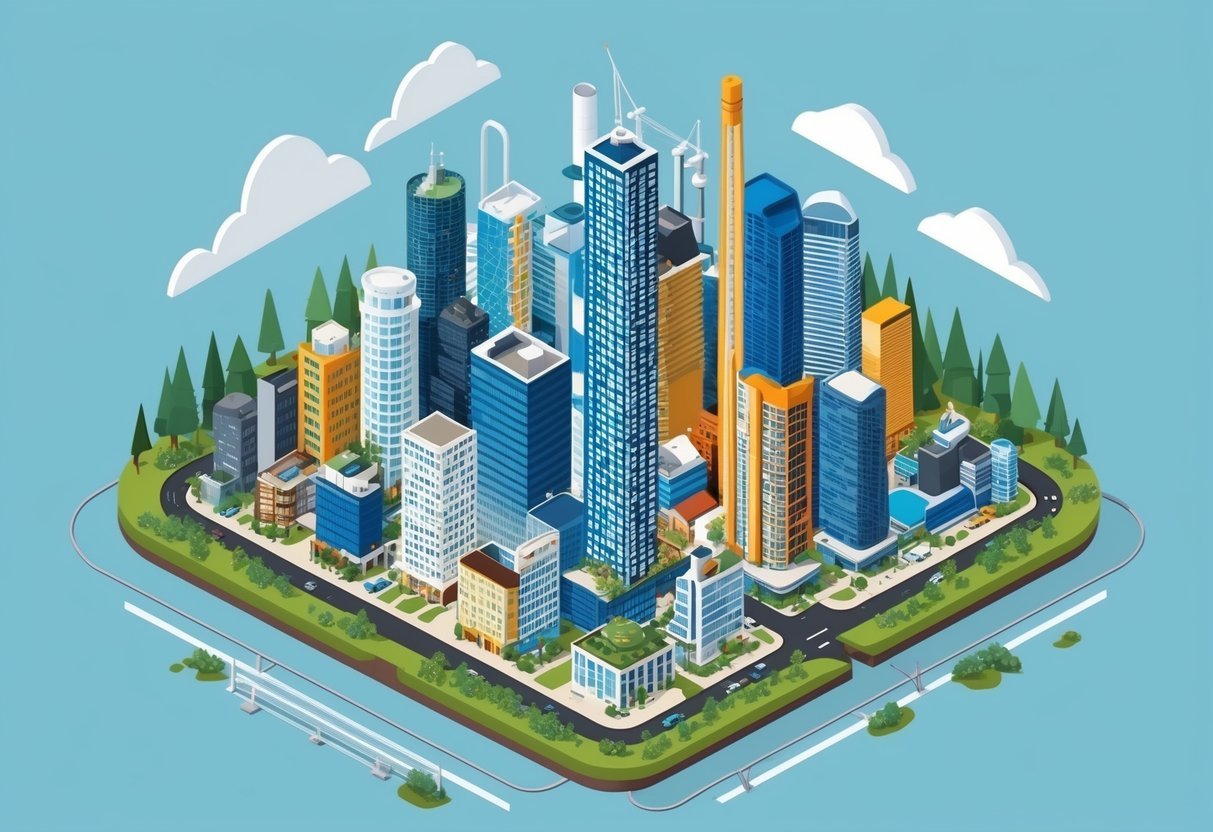
When discussing property values in emerging markets, the regulatory environment is a significant consideration.
Regulations can dramatically alter market dynamics and impact investment potential.
Inconsistent policies can make real estate markets volatile.
Changes in zoning laws, building codes, and environmental regulations can influence property values.
These adjustments may increase costs or restrict development opportunities.
Political stability is another factor affecting the regulatory environment.
Unstable governments can lead to unpredictable policy shifts, impacting investor confidence.
Recently, modern communications and technology have been utilized to better understand and navigate these complex regulatory landscapes.
By staying informed and engaging with local experts, we can better anticipate changes and make informed decisions.
Our strategy involves proactive engagement with policymakers and regulators.
This approach helps us safeguard investments and mitigate potential risks associated with sudden regulatory changes.
Understanding the intricacies of local laws is crucial.
For instance, property ownership rights and foreign investment rules can vary widely between countries, affecting our ability to invest and develop.
Additionally, tax policies are an essential component of the regulatory framework.
They can directly impact the profitability of real estate investments.
Monitoring these policies allows us to optimize financial strategies.
We must also consider the ease of doing business in these regions.
Bureaucratic hurdles or complicated legal requirements can delay projects and drive up costs.
Therefore, we prioritize comprehensive due diligence in our market evaluations.
Local compliance regulations are essential.
Failing to meet these may result in fines or legal issues, negatively affecting property values.
Our goal is to maintain adherence to all relevant laws to secure reliable returns.
5) Economic Growth
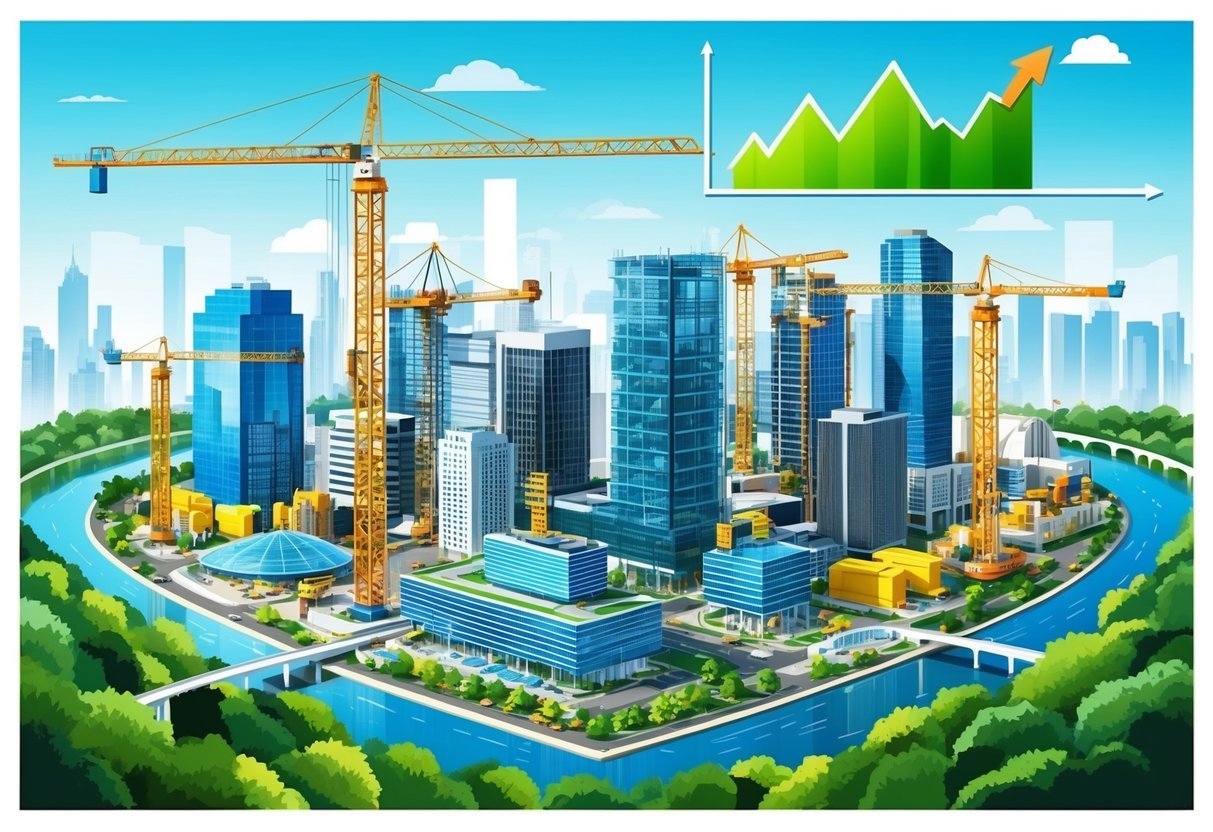
Economic growth plays a crucial role in influencing property values in emerging markets.
As economies expand, we often observe a rise in disposable income, which, in turn, boosts the demand for real estate.
This increase results in heightened competition among buyers, placing upward pressure on property prices.
With growth comes urbanization, attracting individuals to cities in search of better employment opportunities and improved living conditions.
As a result, we see an increased demand for residential and commercial spaces, further propelling property values.
This shift in demographics offers investment potential for those looking to capitalize on growing urban areas.
In emerging markets, infrastructure development often accompanies economic growth, such as improved transportation and communication networks.
These enhancements can make an area more accessible and attractive, leading to appreciation in property values.
We consider infrastructure an essential factor when predicting a location’s real estate potential.
Further, a burgeoning middle class is a hallmark of expanding economies.
As people’s purchasing power improves, their housing expectations and demands evolve, stimulating markets and pushing up property prices.
Investors may find lucrative opportunities in regions experiencing these demographic changes.
We should also recognize that government policies often play a role in facilitating economic growth, such as incentives for property development or foreign investment.
Positive regulatory environments can lead to increased investor confidence, driving demand and influencing values in the property market.
Macroeconomic Factors
In emerging markets, property values are influenced by broader macroeconomic conditions.
Key elements like economic growth and inflation rates play crucial roles in shaping these market dynamics.
Economic Growth
Economic growth can significantly influence property values in emerging markets. Rapid economic development typically leads to increased employment, higher incomes, and improved infrastructure.
These elements drive higher demand for real estate, pushing property values up.
We often see various sectors like technology and manufacturing expanding, resulting in stronger job markets.
With more disposable income, people are likely to invest in property, thereby increasing market activity.
Tracking these growth trends is essential for anyone interested in real estate investment.
Infrastructure improvements, such as new roads and public transportation, also contribute to the desirability and hence the value of properties.
By understanding these growth metrics, we can better predict future property value trends.
Inflation Rates
Inflation rates are another critical factor affecting property values.
High inflation can reduce the purchasing power of consumers, affecting overall real estate demand.
When inflation is low, people have more capacity to invest in property, thereby driving up values.
We notice that central banks often adjust interest rates in response to inflationary pressures.
Lower interest rates generally lead to cheaper mortgage costs, making property investment more attractive.
Conversely, high-interest rates can dampen market enthusiasm, reducing property values.
Understanding how inflation impacts interest rates and, subsequently, property values allows us to make informed decisions.
It’s not just about the current rate but also expectations for future inflation that can sway property investments.
These economic indicators are key to navigating the real estate market.
Government Policies
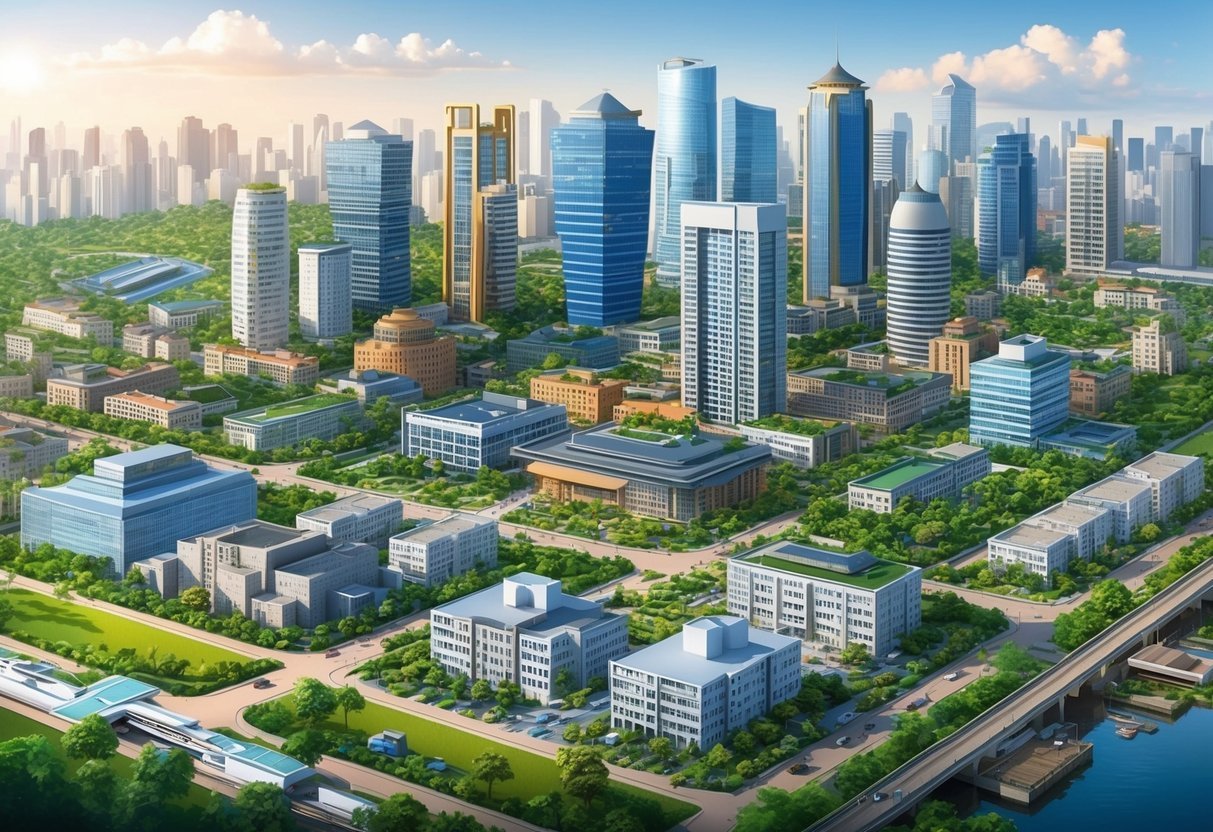
Government policies significantly impact property values in emerging markets through various factors such as regulations, incentives, and tax policies.
These elements can either enhance or limit the potential for growth and investment in real estate.
Understanding these aspects allows us to make informed decisions in the market.
Regulations and Incentives
In emerging markets, regulations and incentives are crucial in shaping the real estate landscape. Zoning laws dictate the types of developments allowed in specific areas, affecting supply and demand dynamics.
Stringent regulations can slow down development, while incentives such as subsidies or grants can boost investment by making development more profitable.
Infrastructure development, supported by government policies, enhances property values by increasing accessibility and the attractiveness of real estate locations.
When governments invest in roads, public transport, and utilities, they facilitate economic activity and improve living standards, which in turn boosts property values.
We must closely monitor these regulatory and infrastructural changes to adequately assess potential impacts on property investments and opportunities.
Tax Policies
Tax policies play a decisive role in determining property value as they influence investor sentiment and operational costs.
Property taxes, capital gains taxes, and other levies on real estate transactions can either encourage or discourage investment.
For instance, high property taxes may deter potential buyers and investors, while tax breaks and incentives can make investments more appealing.
We should also consider the impact of taxation on rental yields.
Countries offering tax relief to developers or landlords might see a surge in rental property investments.
Effective tax policies often indicate a government’s commitment to fostering a conducive business environment, which can bode well for both short-term projects and long-term investment strategies.
It’s essential for us to evaluate these policies to maximize our real estate ventures’ profitability.
Foreign Investment

Foreign investment plays a critical role in shaping property values in emerging markets.
It fuels capital inflow and boosts investor confidence, both of which have significant impacts on real estate dynamics.
Capital Inflow
Foreign Direct Investment (FDI) injects substantial capital into emerging markets, thereby raising demand for real estate.
As more investors seek opportunities, competition for properties intensifies, often leading to an increase in valuations.
This influx of capital can rejuvenate underdeveloped areas, attracting further investments and promoting infrastructure development.
Key impacts of Capital Inflow:
- Increased Demand: More buyers enter the market, creating a seller’s market.
- Rising Property Prices: Heightened competition can drive up property values.
- Improved Infrastructure: Areas receiving high FDI often see upgrades in transport and utilities, further amplifying property appeal.
Investor Confidence
Investor confidence acts as a catalyst for sustained economic growth in property markets.
High confidence levels encourage foreign investors to commit resources, anticipating profitable returns.
Confidence is often fostered by political stability, economic policies favoring foreign investments, and transparency in real estate transactions.
Vital factors affecting Investor Confidence:
- Policy Stability: Supportive government policies can enhance trust.
- Economic Growth: Strong growth prospects make markets attractive.
- Transparency: Clear legal frameworks for property rights can mitigate risks, encouraging investment.
By recognizing the drivers behind these factors, we can better navigate the intricacies of property investment in these dynamic regions.
Frequently Asked Questions
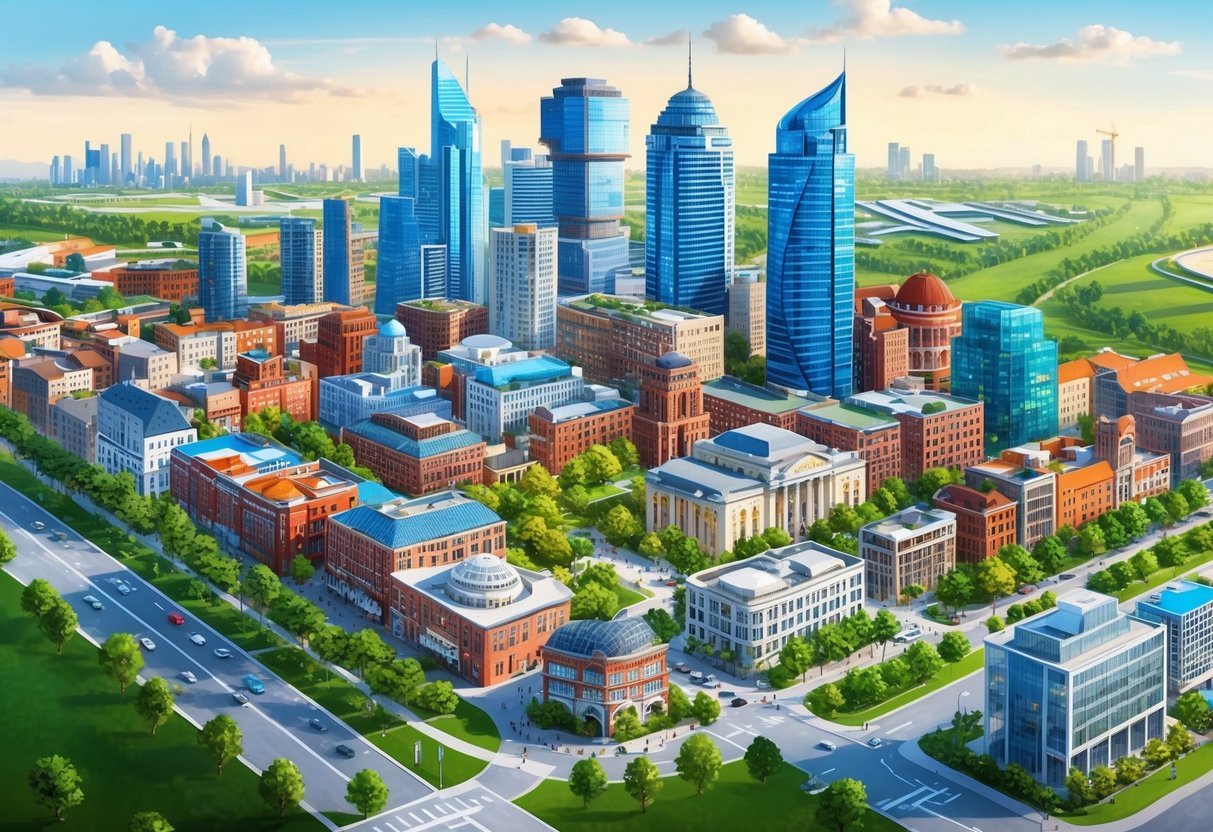
Our focus here is to explore how different factors, such as infrastructure, economic trends, and technological advancements, influence property values in emerging markets.
We’ll also consider the roles of government policies and demographic shifts in shaping these values, along with any environmental factors.
How does infrastructure development impact property values in emerging markets?
Infrastructure development directly affects property values by improving accessibility and connectivity.
As roads, utilities, and public transport systems expand, areas become more attractive to investors and residents alike.
These improvements often lead to increased demand and higher property prices as the regions become more desirable places to live and work.
In what ways do economic trends affect the real estate market in new growth areas?
Economic trends such as growth in disposable income and employment rates can drive demand for real estate.
For instance, as emerging markets experience robust economic growth, more people can afford to buy properties, pushing up prices.
Additionally, an expanding middle class often leads to higher demand for housing and commercial spaces, which boosts property values.
What role do government policies and regulations play in shaping property values in underdeveloped regions?
Government policies and regulations significantly impact property values through zoning laws, development incentives, and tax structures.
Favorable policies can attract investors by making development projects more viable, while restrictive regulations may hinder growth.
Additionally, government stability and support for infrastructure projects can enhance real estate prospects, making areas more attractive for long-term investments.
How do demographic shifts influence the housing demand and property values in emerging markets?
Demographic changes, such as population growth and urbanization, can lead to increased housing demand.
As more people move to urban centers in search of jobs, the demand for residential and commercial properties rises.
This shift often results in higher property values as the supply struggles to meet the growing demand in these burgeoning areas.
Can technological advancements in construction methods affect property investments in nascent markets?
Technological advancements in construction, such as prefabrication and sustainable materials, can reduce building costs and timeframes.
These innovations make property investments more appealing by increasing the efficiency and quality of new developments.
As a result, emerging markets may experience a surge in property development, which could lead to more competitive pricing and attractive investment opportunities.
What environmental considerations could impact real estate valuations in developing areas?
Environmental considerations, such as climate change and resource availability, can profoundly impact real estate values.
Areas prone to natural disasters or lacking sustainable resources may become less attractive, affecting property prices.
Conversely, developments that incorporate eco-friendly designs and renewable energy sources can command higher values due to growing demand for sustainable living solutions.

